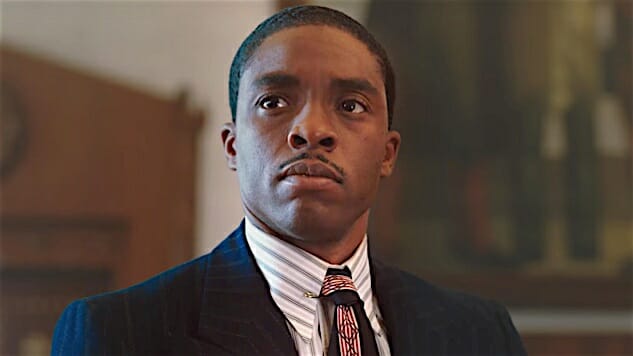Marshall

At the movies as in life, it’s hard to convey righteousness without coming across as strident, precious or self-serious. Marshall, the new biopic about Thurgood Marshall, mostly settles for somnolence, delivering important, timely messages about bigotry and the ongoing fight for equality with all the urgency of a comfy old sweater. A sort of origin story about how Marshall became a significant civil-rights leader who would later be appointed the first African-American judge on the Supreme Court, this courtroom drama finds Chadwick Boseman once again portraying a real person, but there’s not much insight into the man—nor is there much depth to the film’s study of racism’s vile infestation in the American soul.
Set in 1941, Marshall follows as Thurgood (Boseman) travels to lilywhite Connecticut to defend Joseph Spell (Sterling K. Brown), a black chauffeur accused of raping and trying to kill Eleanor Strubing (Kate Hudson), the white wife of Joseph’s wealthy employer. The only lawyer in the NAACP, which dispatches him across the country to fight for black defendants, Thurgood isn’t technically allowed to be Joseph’s attorney since he doesn’t have a license to practice law in Connecticut. Enter, reluctantly, Sam Friedman (Josh Gad), a mild-mannered insurance attorney who has never tried a criminal case but is convinced by Thurgood to be his surrogate in court. Thurgood isn’t allowed to speak during the trial, forcing him to feed notes to the inexperienced and nervous Sam.
Director Reginald Hudlin and father-and-son screenwriters Michael and Jacob Koskoff have based the film on actual events, but Marshall’s conventionality might lead one to assume that it’s all been invented to satisfy undemanding awards-season audiences. From the initial oil-and-water contentiousness between Thurgood and Sam to the eventual (albeit temporary) victory over institutional racism, the movie consistently goes down a little too easy—no obstacle, no violent bigot, can stand in the way of Marshall’s inevitable path to justice.
Previously, Boseman (now probably best known as Marvel’s Black Panther) electrified as James Brown in the nervy 2014 biopic Get On Up, where he channeled the showman’s cocky, paranoid swagger. A year earlier, he’d been far less enrapturing in 42, in which he played Hall-of-Famer Jackie Robinson, portraying the Brooklyn Dodgers superstar with plenty of dignity but not much dynamism. Boseman operates in a similar vein in Marshall, giving us a Thurgood Marshall who has fire in his belly and an impatience for the subtle (and sometimes not-so-subtle) racism he encounters during Joseph’s trial. But for such a significant civil-rights figure, the Thurgood we meet isn’t particularly compelling or arresting. Rather, he feels like he’s been plugged into a formulaic narrative—one in which he’s just the latest version of the standard hotshot-legal-genius character who always knows the perfect cross-examination question to ask.
Plenty of biopics make the case for their subject’s brilliance. (And the cinematic courtroom drama is often riveting precisely because it’s fun to watch a sharp, virtuous attorney tear apart his opponents.) But Hudlin, a frequent television director helming his first feature in 15 years, fails to bring the character to life. Thurgood is virtuous, but his righteous anger is rarely cathartic or inspiring—there’s a blandness to the script that drowns the character in vague piety. We’re on Thurgood’s side from the start—and Boseman gives us delicious moments in which this cocky lawyer relishes upsetting the white power establishment around him—but Marshall never seems all that curious about who he is or what makes him tick. And that blandness is mirrored by Marshall’s staid docudrama vibe, which doesn’t yield much gravitas or a sense of a great moral reckoning coming down the tracks.